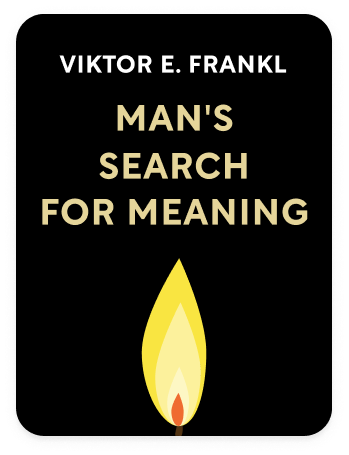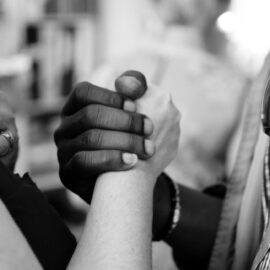

This article is an excerpt from the Shortform book guide to "Man's Search For Meaning" by Viktor E. Frankl. Shortform has the world's best summaries and analyses of books you should be reading.
Like this article? Sign up for a free trial here .
What is psychological resistance? How can you build it, and why do you need it?
Psychological resistance is a person’s ability to survive events that are psychologically difficult or damaging. In his book Man’s Search for Meaning, Viktor Frankl puts forth three methods of resistance.
Read more about psychological resistance and how it takes shape.
Methods of Psychological Resistance
We’ll discuss 3 main methods of resisting psychologically difficult circumstances: inner lives, future goals, and the freedom to choose. These are the three methods of psychological resistance that can help people learn how to build strength.
Inner Lives
Humans are one of the few creatures on earth who have inner lives–personal, private, intangible thoughts and feelings that make us individuals. Our inner lives are a psychological place we can retreat to when external circumstances become overwhelming. This is the first method of psychological resistance.
Our inner lives are where we can find happiness, even in terrible external circumstances. Frankl offers a few examples of inner life categories:
- Humor: Though humor was one of the abnormal reactions prisoners experienced while in shock, humor could also lift a prisoner’s spirits by allowing them to distance themselves from and rise above the situation, even if only for a few minutes or seconds.
- Art: There were instances of art in the concentration camps. Prisoners hosted improvised cabarets from time to time, with music, poetry, and per our last point, comedy.
- Religion: Religious and spiritual interest of the prisoners deepened during their time in the concentration camps, and prisoners often had improvised religious services in stolen moments and tucked away places.
- Beauty: The beauty of nature intensified for prisoners, and the view of a glowing sunset through the barred windows of a train could remind prisoners of the world outside of the bleak camp.
- Imagination: The imagination can serve as an escape. Frankl would picture mundane scenes from his old life in great detail, which gave him mental respite from the camps.
- Love: Love is a huge facet of our inner lives. Frankl would often picture his wife in great detail to boost his spirits.
Frankl observed a marked difference in well-being between prisoners with rich inner lives and prisoners without: the prisoners who let go of their inner lives succumbed to their surroundings and had a harder time psychologically and less chance of surviving. In fact, physically weaker prisoners sometimes survived camp better than heartier prisoners precisely because these weaker prisoners had been more focused on their inner lives before they were put in camps.
Future Goals
The ability to conceive of future goals helped get many prisoners through their time in the concentration camps. This is the second method of psychological resistance.
Nietzsche said, “He who has a why to live can bear with almost any how.” When we set goals for our future, we give ourselves things to work towards. In other words, we give ourselves the why. And if these goals have an important meaning for us, we are far more likely to see them through, because the importance motivates us to weather the hard stages to reach our goal.
- Suicide was rampant in the concentration camps, as most prisoners felt they had nothing to live for. Frankl helped two suicidal men set future goals. One of the men had a son who was waiting for him in a foreign country; the second man was a scientist and had a series of books in progress that only he could finish. These future-oriented goals–things to do or people to see that required them to survive–dispelled the men’s ideas of suicide and helped motivate them.
In contrast, prisoners who lost faith in their own future had nothing to keep them going in extremely difficult circumstances.
- Some prisoners admitted that when they arrived at the camps, it felt like they’d already died and had no future. These prisoners would often get lost in retrospection, obsessing over the past. This prevented them from finding any opportunity in the present–as horrible as it was–to feel positive, thus making it harder to continue living.
- Death rates rose significantly around Christmas 1944 and New Year’s 1945–many prisoners had lived with hope that they’d be home by the holidays, and lost that hope as they reached the holidays.
The Freedom to Choose
It may sometimes feel like we’re completely at the mercy of our surroundings–especially in truly difficult circumstances–but that’s not the case. Humans have the freedom to make choices, no matter what the situation is. This is the third method of psychological resistance.
Think about terminally ill people. It might seem like they have no choice, and this might be true medically–but they can still choose how to face their illness and what to do with the rest of their time. Sometimes, in circumstances like this, our freedom to choose how we approach something is the only freedom we have left.
- Frankl received a letter from a young invalid who had learned he had no medical options and would die soon–but he’d seen a movie where a man chose to face death with courage, and the invalid now saw his own chance to do the same.
In the concentration camps, prisoners had to continually choose whether to succumb to their horrible surroundings or preserve their inner selves, freedoms, and values.
- Frankl volunteered for medical duties at a concentration camp where there were typhus patients. Even though he risked getting typhus himself and dying, at least his death would have meaning in those circumstances: a doctor trying to save people.
At the very least, we have the freedom to choose how we view a situation, even one of hardship and suffering, and this freedom can’t be taken away from us by external forces
All three of these methods center around an idea that was already important to Frankl and his psychotherapy career before he entered the concentration camps: the idea of a meaningful life. Our inner lives are built on things we find meaningful; our future goals are often built around what we find meaningful; and by making choices, we affirm what we find meaningful.

———End of Preview———
Like what you just read? Read the rest of the world's best book summary and analysis of Viktor E. Frankl's "Man's Search For Meaning" at Shortform .
Here's what you'll find in our full Man's Search For Meaning summary :
- How Viktor Frankl survived four Nazi death camps
- Frankl's life-changing advice for coping with suffering
- Why focusing on what you enjoy isn't enough to make your life meaningful






